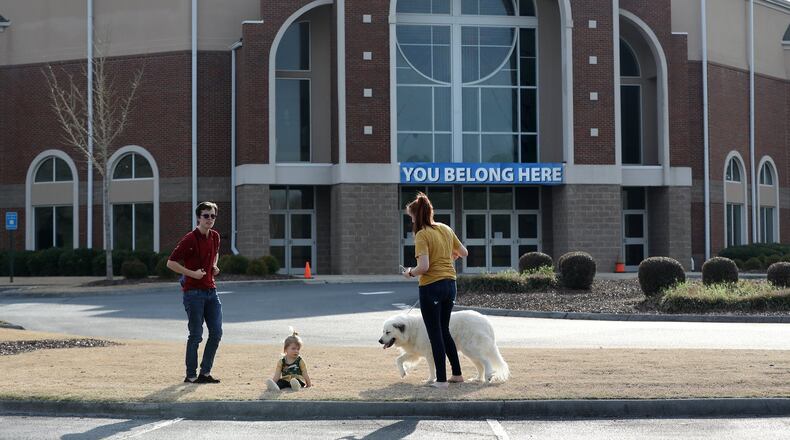The coronavirus pandemic has forced Gov. Brian Kemp to make a string of tough decisions. One that he has more visibly struggled over is whether to impose restrictions on religious services.
That tension heightened Friday when a second state legislator confirmed he attended a Cartersville church linked to multiple illnesses and two deaths from COVID-19, the disease caused by the coronavirus.
News of state Rep. Matthew Gambill's illness comes as Kemp wrestles with whether to mandate how churches operate amid the crisis. For now, he has settled on a balancing act: Banning many large gatherings, while offering houses of worship the option to congregate as long as they practice social distancing. If they fail to comply, he said the other day during a private call with more than 800 clergy members, the state could shut them down.
That hasn’t happened yet. Instead, Kemp has highlighted those abiding by the rules, whether by holding services online or keeping people at least six feet away from each other. On this week’s conference call, he invoked one congregation that recently worshipped outside.
“The community is going to be what stops this coronavirus,” he told the pastors. “There is no cure right now. There is no vaccine. The only thing we can do right now is to work together until there is one.”
A sharper warning came from Dr. Kathleen Toomey, the state’s public health commissioner. The state, she said, has several hotspots of outbreaks, including in Albany, Bartow County and Rome. She added that in virtually all those cases, some of the spread was linked to large church services. An outbreak in Dougherty county, for example, has been traced to two funeral services in late February and early March.
“This is a short period of inconvenience and worry, but if we invest in this collectively as a community, we can help stop this virus,” said Toomey, who urged churches, synagogues and mosques to offer online services, if they can.
That can be a challenge for Jewish houses of worship. Some of the more liberal congregations have been live-streaming services for years. Other communities that follow strict rules prohibiting the use of electronics on the Sabbath are canceling services or seeking loopholes in Jewish law for allowing online prayer.
“It really puts us between a rock and a hard place. For many observant Jews, Shabbat is the time to unplug and be off the screen,” said Rabbi Joshua Heller of B’nai Torah, a Sandy Springs synagogue, using the Hebrew word for Sabbath. “But the only way to have community on Shabbat is to be on the screen.”
Kemp made the right decision by not requiring churches to close altogether, said the Rev. Timothy McDonald III, senior pastor of First Iconium Baptist Church in Atlanta. First Iconium’s services are now livestreamed, but McDonald is considering holding them in the parking lot where people can remain in their cars and listen through speakers.
“Two weeks ago, I would not have considered the parking lot,” he said. “You run into the issue of separation of church and state. My message to the governor was: ‘You don’t get to tell the church what to do. You don’t. That won’t sit well with most pastors.’”
In Cartersville this month, state health officials initially connected as many as 15 cases of COVID-19 to the Church at Liberty Square, said Dr. Gary Voccio, who leads the Georgia Department of Public Health’s northwest district, which covers Bartow and nine other counties.
“It was an outbreak of COVID-19,” he said. “Somebody unsuspected, possibly with the coronavirus, was in that space and infected a lot of people.”
The church has closed its doors to the public and switched to online services and is communicating with state health officials, said the Rev. Jeff Arnold, the church’s administrative pastor and chief financial officer.
On Friday, Gambill said it is possible he contracted illness while attending the church on March 1, but added, “we truthfully don’t know.” He learned of his positive COVID-19 test results Thursday.
“It has really hit our community hard,” said Gambill, who represents the Cartersville area.
Others who attended the church on March 1 and who have tested positive for COVID-19 include a married couple from Calhoun, a retired Cobb County sheriff’s deputy from Rome and state Sen. Bruce Thompson of White. Thompson has said he is confident he did not contract his illness at the house of worship.
Two others who attended the church's March 1 service died after testing positive for the disease: Elizabeth Wells, 65, a former Wellstar Health System worker from Rome, and Harold Passmore, 78, a former Lockheed Martin employee from Fairmount.
Passmore was also diagnosed with the flu and pneumonia before he died Monday, said his granddaughter, Anna Bearden of Fairmount, who emphasized she does not fault the church.
“He loved the Church at Liberty Square,” she said. “He was the most precious and sweetest man. I’m telling you right now, you could never find a better man than him.”
Keep Reading
The Latest
Featured





